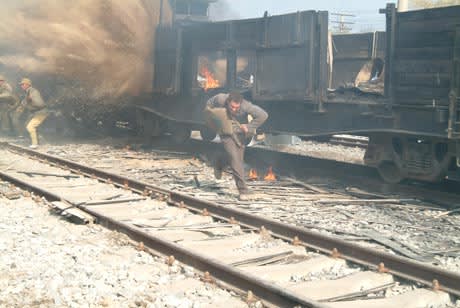Going the route of most international productions, The Children of Huang Shi attempts to give narrative gravity and attract North American audiences by overshadowing a significant moment in Chinese history with the banal love story of two camera-friendly Caucasians. Like a pimple on otherwise perfect skin, the characters are drawn with single-minded nobility and one unique flaw to make them human. Its a simplistic and not entirely convincing approach to characterisation that detracts from the impact of an otherwise interesting film.
George Hogg (Jonathan Rhys Meyers), a young British journalist, poses as an aid worker in 1937 China in order to gain access to Nanjing, an area sanctioned off by the Japanese. After stumbling upon a mass execution, he finds himself in a sticky situation with the Japanese until being rescued by an explosives expert who is part of a communist Chinese resistance group, Chen Hensheng (Chow Yun-Fat).
By some clever manoeuvring on the part of Chen, Hogg finds himself taking refuge at a dilapidated orphanage for boys. He initially finds the situation difficult, being rejected by the untamed youths primarily the belligerent, anti-authority Shi-Kai (Guang Li) that is until the arrival of a deeply empathic Australian nurse with a secret (Radha Mitchell). With her help and guidance, Hogg teaches the orphan boys lessons of hygiene, mechanical repair, language and the cultivation of land. When the threat of Japanese invasion becomes increasingly urgent, he decides to take the boys on a harrowing journey through mountains and snow to find shelter in a far off place.
At the centre of a story that is certainly worthy of the big screen treatment is a detached and almost mathematical screenplay that gives little emotion to what should be a passionate epic. Each character reaction, accidental cut and step forward in plot is methodical and contrived, thus creating a predictability and coldness to the various outcomes. This artificiality tends to gloss over interesting character conflicts in favour of unconvincing romance and an almost mystical heroism. This is a shame, as subplots involving discord between the forgiving Hogg and more vengeful Chen, as well as the struggles Michelle Yeohs character copes with as an opium dealer, are far more interesting and complex than whats displayed on screen.
While the set designs and cinematography are often impressive to watch, Spottiswoodes direction is surprisingly flat and the editing is often sloppy. What stands out about Huang Shi are the first-person testimonials from the remaining orphans, shown over the closing title sequence. They suggest that a documentary approach to the subject matter may have been somewhat more effective.
(Mongrel Media)George Hogg (Jonathan Rhys Meyers), a young British journalist, poses as an aid worker in 1937 China in order to gain access to Nanjing, an area sanctioned off by the Japanese. After stumbling upon a mass execution, he finds himself in a sticky situation with the Japanese until being rescued by an explosives expert who is part of a communist Chinese resistance group, Chen Hensheng (Chow Yun-Fat).
By some clever manoeuvring on the part of Chen, Hogg finds himself taking refuge at a dilapidated orphanage for boys. He initially finds the situation difficult, being rejected by the untamed youths primarily the belligerent, anti-authority Shi-Kai (Guang Li) that is until the arrival of a deeply empathic Australian nurse with a secret (Radha Mitchell). With her help and guidance, Hogg teaches the orphan boys lessons of hygiene, mechanical repair, language and the cultivation of land. When the threat of Japanese invasion becomes increasingly urgent, he decides to take the boys on a harrowing journey through mountains and snow to find shelter in a far off place.
At the centre of a story that is certainly worthy of the big screen treatment is a detached and almost mathematical screenplay that gives little emotion to what should be a passionate epic. Each character reaction, accidental cut and step forward in plot is methodical and contrived, thus creating a predictability and coldness to the various outcomes. This artificiality tends to gloss over interesting character conflicts in favour of unconvincing romance and an almost mystical heroism. This is a shame, as subplots involving discord between the forgiving Hogg and more vengeful Chen, as well as the struggles Michelle Yeohs character copes with as an opium dealer, are far more interesting and complex than whats displayed on screen.
While the set designs and cinematography are often impressive to watch, Spottiswoodes direction is surprisingly flat and the editing is often sloppy. What stands out about Huang Shi are the first-person testimonials from the remaining orphans, shown over the closing title sequence. They suggest that a documentary approach to the subject matter may have been somewhat more effective.
